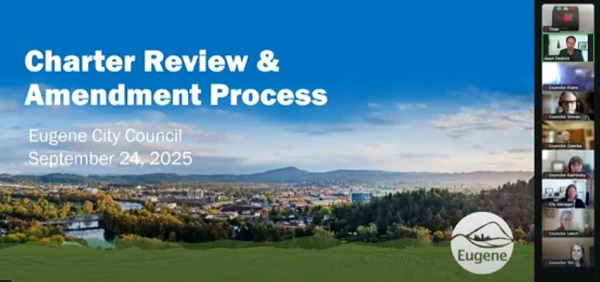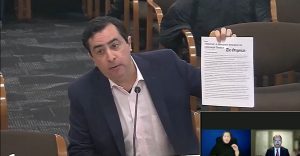Should Eugene city councilors get a pay raise?
4 min read
Presenter: Should Eugene city councilors be paid more? Introducing potential changes to the city charter Sept. 24, Policy Analyst Jason Dedrick:
Jason Dedrick (Eugene, policy analyst): My name is Jason Dedrick in the City Manager’s Office, here today to provide you an update on the charter review and amendment process.
[00:00:16] There are two different ways to amend the charter. One is the way you’re currently pursuing, which is council-initiated amendments by referral. The other way is citizen-initiated amendments by petition. In either case, both options are placed on the ballot for Eugene electors to decide.
[00:00:32] Presenter: The council directed staff to provide options relating to mayor and council compensation. Jason Dedrick:
[00:00:39] Jason Dedrick (Eugene, policy analyst): Currently, mayor and councilors receive a stipend for their service. That stipend was initially set and has been adjusted each fiscal year based on the Consumer Price Index West. The current annual stipends for the mayor is just over $32,000 and stipends for councilors are just over $21,000 annually.
[00:01:01] Stipends are in addition to expense reimbursements that mayor and councilors receive and mayor/councilors do not receive fringe health benefits, but, however, health insurance can be purchased from the city.
[00:01:15] So looking at other cities, the current stipend that the mayor and counselors receive is slightly below that of other comparison cities. Several cities do not offer health insurance at all. For those that do offer health insurance, a higher percentage of the premiums are paid by the city compared to Eugene. Other nonstipend benefits are similar to what other cities provide.
[00:01:37] None of the cities set their compensation amount in charter. It’s all dealt with in other documents. And then several cities use a citizen committee to review and set their compensation amounts.
[00:01:50] So your options here could include: pursuing changes to the amount of compensation in the charter and leaving compensation in the charter. Another option could be to pursue changes to compensation but remove the language from the charter and delegate oversight of future compensation to a citizen committee by ordinance or you could choose to not pursue changes to compensation in the charter at this time.
[00:02:13] Presenter: Councilor Matt Keating:
[00:02:15] Councilor Matt Keating: I’m supportive of an independent, community-driven commission to provide the oversight, to make the proper recommendations and suggestions in regards to equitable compensation for council and mayor.
[00:02:28] It’s woefully inadequate, and frankly, should be rightsized, to be somewhere near the median income for the community. So I appreciate that recommendation in particular.
[00:02:41] Presenter: Facing abrupt cuts in federal funding, others said this is not the time. Councilor Mike Clark.
[00:02:47] Councilor Mike Clark: I agree with both Eliza and Alan that this is not the right time for us to put the question of altering the charter to the general public. But I would be, Greg, interested in directing this towards future discussion of an informed committee bringing back more information and making it a more of a community conversation where others can weigh in.
[00:03:14] But at this point, putting it on the ballot as a question, whether it’s fair to say or not, it would appear, in my opinion, self-serving at a time where we are facing some potential revenue challenges additionally to what we’ve faced already in the past, and I think there are a lot of hard decisions ahead, and it’s just the wrong time for us to put this particular question of changing the charter on the ballot.
[00:03:44] Presenter: Councilor Matt Keating:
[00:03:46] Councilor Matt Keating: I vehemently respectfully disagree with the sentiments or statements that my colleagues have made.
[00:03:54] This is a matter of parity. It’s a matter of equity. If we want to see a more diverse array of people run for office, that in all levels of government, that public service needs to be fairly and equitably allocated, or it’s woefully inadequate and it’s embarrassingly low.
[00:04:17] And I encourage my colleagues to at least advance the conversation, to put it ultimately to a vote of the public. I think you would find yourself pleasantly surprised in this progressive community that fair and equitable compensation for elected officials is an appropriate ask and an appropriate action.
[00:04:44] Presenter: Council President Greg Evans:
[00:04:46] Councilor Greg Evans: I’m not seeing total consensus around this yet, but I think that having additional staff research would be appropriate in this venue, basically, because I don’t think that we have enough information on comparables and what other communities and other cities are doing, whether that’s within the state of Oregon or nationally.
And it is an apples-to-oranges comparison, because we’re not Chicago, we’re not New York. At the same time, we’re not Medford either.
[00:05:21] So, the solution to this is more in, I would say, be embedded into a citizen committee. But in lieu of us making that decision, I would move to direct additional staff research.
[00:05:38] Presenter: City councilors hope to start a conversation on their pay rate.






